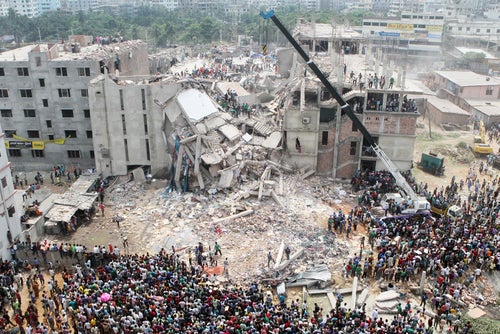
A judge in Bangladesh resumed the trial on Monday (31 January) for the industrial tragedy of Rana Plaza that took place in Dhaka on 24 April 2013 and led to the deaths of more than 1,000 garment workers and injured thousands more.
A report published by France24 claims a judge has ordered the trial to be resumed for 36 of the original defendants, however, three have since died, and a prosecution request to vacate the two suspended indictments will be considered separately.
The trial is being conducted five years after the court trial in 2016 that formally charged 38 people, including Rana Plaza owner Sohel Rana and his parents, with murder.
The 2016 trial was put on hold due to several defendants trying to get their charges vacated, and the country’s high court suspending the indictments of two local officials accused of approving the building, according to France24.
Chief public prosecutor Sheikh Hemayet Hossain told Agence-France Presse (AFP) at the start of the trial this week: “We want to conclude the trial as quickly as possible. Already too much time has been wasted.”
He added: “The building didn’t have any (construction) plan. It would shake when machines were switched on. And the owner of the building, Sohel Rana, used hired muscle to force the workers to go to work on the day of the collapse.”
France24 also reports that Hossain said all of the accused except Rana have been freed on bail and Rana’s father, who was a co-owner of the complex, is among the defendants who died before facing trial, according to fellow prosecutor Shamsur Rahman.
Mostafiz Uddin, managing director of Bangladesh’s Denim Expert Limited told Just Style he has mixed feelings about the news.
“On the one hand, I think it is important that justice is done for the people who lost their lives and their families. On the other, I am frustrated like many others that this case has dragged out for so many years,” he said. “These continued delays do not help anybody, least of all the families but also the international reputation of Bangladesh. Let us hope that this case can be resolved, justice be done, and the perpetrators punished and held to account for their crimes. We can never, ever forget Rana Plaza but the families who lost loved ones do need closure and a resolution of this case might help with that.”
Ahead of the eighth anniversary of the Rana Plaza collapse last year, the IndustriAll Global Union urged consumers to join social media action to campaign for safe factories for garment workers.
Just Style’s official sourcing guide to Bangladesh reveals that Bangladesh’s apparel sector has come a long way since the Rana Plaza tragedy and it’s growing its position as a key outsourcing hub and the second-largest apparel exporting country in the world.
However, a recent report conducted by University of Aberdeen’s Professor M. Azizul Islam, in collaboration with non-profit organisation Traidcraft Exchange, found female garment workers in Bangladesh had to contend with tougher production targets and no overtime payments due to cancelled retail orders during the pandemic.



